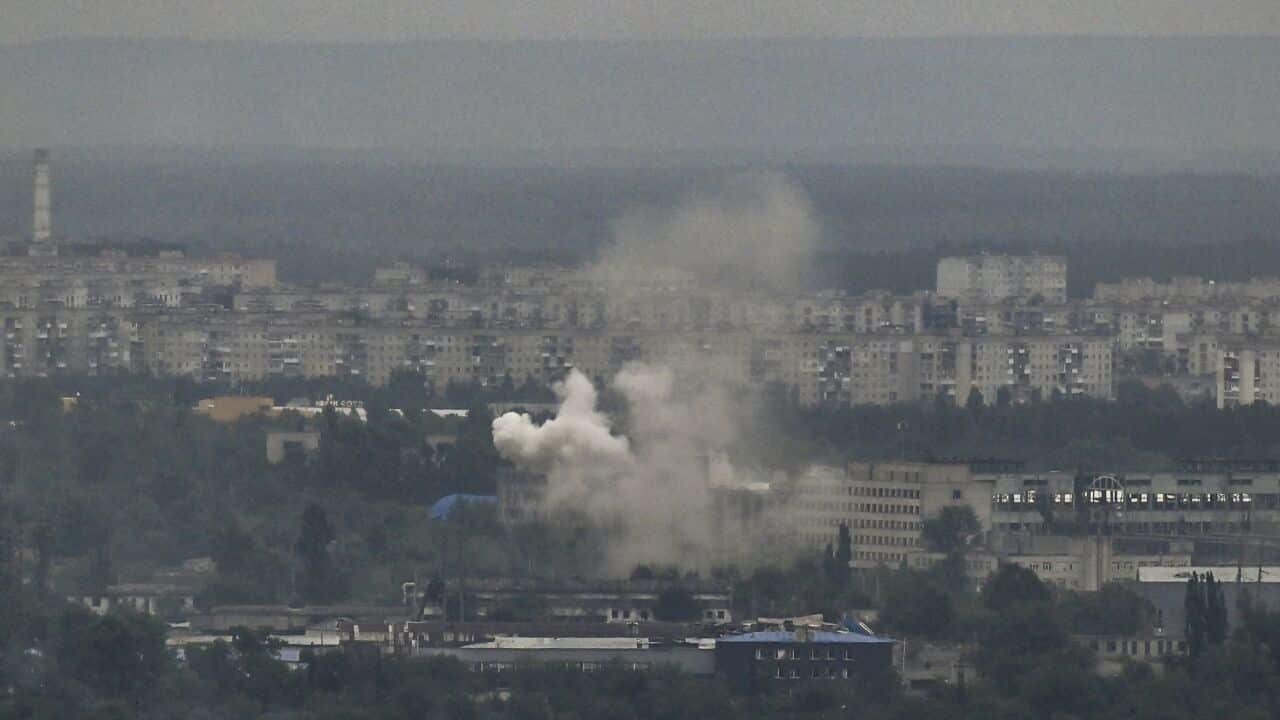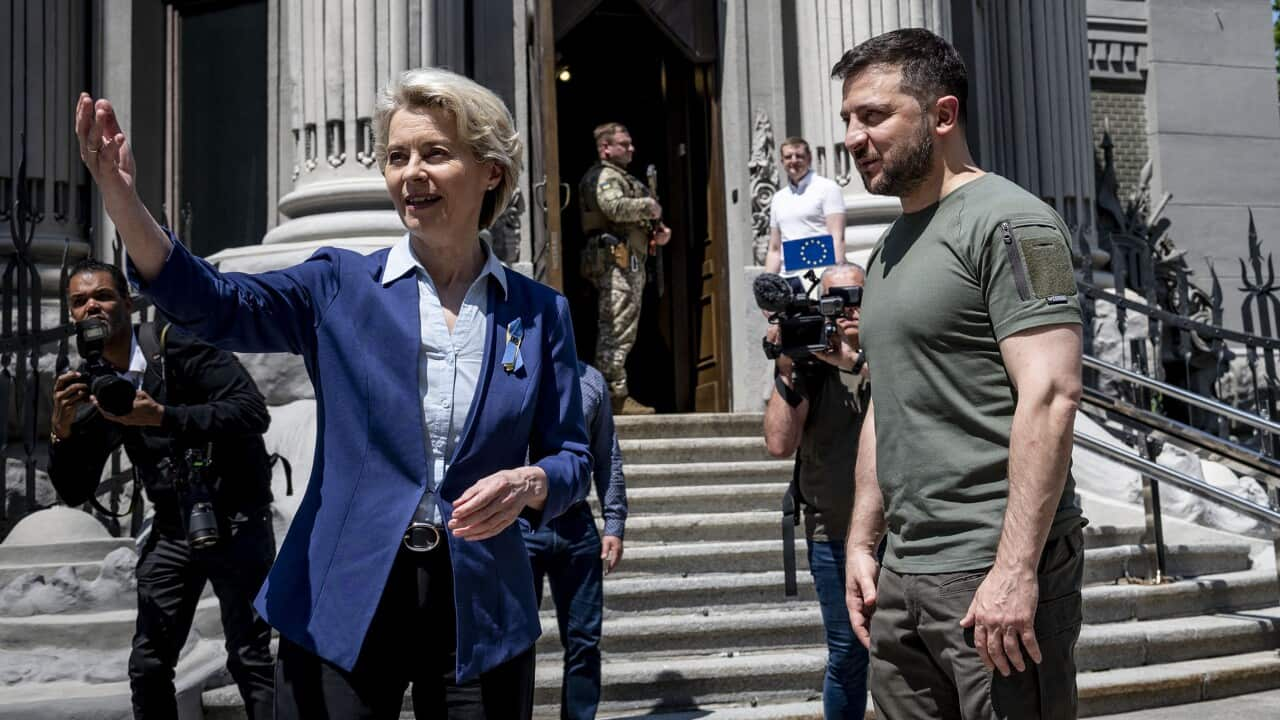Key Points
- Regional governor Sergei Gaidai said on social media that all bridges out of the city had been destroyed.
- Ukraine has issued increasingly urgent calls for more Western heavy weapons to help defend Severodonetsk.
Russian forces tightened their grip on the eastern Ukrainian city of Severodonetsk on Monday, a Ukrainian official said, cutting off the last routes for evacuating citizens in a scene that echoed last month's siege of the port of Mariupol.
Amid heavy bombardment, regional governor Sergei Gaidai said on social media that all bridges out of the city had been destroyed, making it impossible to bring in humanitarian cargoes or evacuate citizens.
"It is now fully impossible unfortunately to drive into the city, to deliver something to the city. Evacuation is impossible," Mr Gaidai said.
He said 70 per cent of the small industrial city - now the focus of one of the bloodiest battles of the war - was under Russian control, but that the remaining Ukrainian defenders were not completely blockaded.
"They have the ability to send the wounded to hospitals, so there is still access," he told Radio Free Europe/Radio Liberty's Ukrainian service. "It's hard to deliver weapons or reserves. Difficult, but not impossible."
Ukraine has issued increasingly urgent calls for more Western heavy weapons to help defend Severodonetsk, which Kyiv says could hold the key to the battle for the eastern Donbas region and the course of the war, now in its fourth month.
Ukraine's military command said in a briefing note that Russian forces were trying to take full control of Severodonetsk, but that an assault on Ukrainian positions in the southeast of the city had failed.
"The battles are so fierce that fighting for not just a street but for a single high-rise building can last for days," Gaidai said earlier. He is governor of the Luhansk region that includes Severodonetsk.
Russian artillery fire pummelled the Azot chemical plant, where hundred of civilians were sheltering, he said.
Damien Magrou, spokesperson for the International Legion for the Defence of Ukraine that has had forces in Severodonetsk, said the situation there risked becoming like Mariupol, "with a large pocket of Ukrainian defenders cut off from the rest of the Ukrainian troops".
"This is one of the reasons why it is so important that our Western partners deliver long-range artillery as fast as possible," he said.

NGO Promote Ukraine, together with the Institute of Innovative Governance and Avenir de lEurope organised a symbolic EU-Ukraine human chain around the Nerlaymont, EU Commission headquarter on 12 June, 2022 in Brussels, Belgium. Source: Getty / Thierry Monasse/Getty Images
'Surrender or die'
Russia's RIA news agency quoted a pro-Moscow separatist spokesperson, Eduard Basurin, as saying Ukrainian troops were effectively blockaded in Severodonetsk and should surrender or die.
Ukraine's account of civilians trapped in an industrial plant echoed the fall of Mariupol last month, where hundreds of civilians and badly wounded Ukrainian soldiers were trapped for weeks in the Azovstal steelworks.
Russia has denied targeting civilians in what it calls a "special operation" to restore Russian security and "denazify" its neighbour. Ukraine and its Western allies call this a baseless pretext for an invasion which has killed thousands of civilians and raised fears of wider conflict in Europe.
More than 5 million people have fled the assault and millions more are threatened by a global energy and food crisis due to disrupted gas, oil and grain supplies from Russia and Ukraine. Western nations are divided over how best to end it.
Mr Gaidai said a six-year-old child was among those killed in the latest shelling of Lysychansk. Officials in the Russian-backed separatist-controlled Donetsk region said at least three people, including a child, were killed and 18 were wounded by Ukrainian shelling that hit a market in Donetsk city.
The Donetsk News Agency showed pictures of burning stalls at the central Maisky market and several bodies on the ground. The news agency said 155-mm calibre NATO-standard artillery munitions hit parts of the region on Monday.
Reuters could not independently verify either report.
Burning crops
After failing to take the capital Kyiv following the 24 February invasion, Moscow focused on expanding control in the Donbas, which comprise Luhansk and neighbouring Donetsk and where pro-Russian separatists have held territory since 2014, while also trying to capture more of Ukraine's Black Sea coast.
Along the front line in the Donbas, the fighting poses a new threat as the weather warms, with shelling and rocket fire setting fields on fire and destroying ripening crops.
Lyuba, a resident in the Ukrainian-held pocket of the Donbas near the front, watched a fire blazing along the fields but said she was not planning to leave. "Where can I go? Who is waiting for me there?" she said. "It's scary. But it is what it is."
In Bakhmut, in Donetsk, a resident who gave her name as Valya surveyed the wreckage of an apartment block local authorities said had been hit by an air strike.
"We went to bed, we are old people, you know. And then all of a sudden... Terrifying, look what happened," she said. "There is nothing good happening here. And it is not clear how this will end."
Ukrainian Presidential Adviser Mykhailo Podolyak listed equipment he said was needed from Western allies for heavy weapons parity, including 1,000 howitzers, 500 tanks and 1,000 drones.
Russia issued the latest of several recent reports saying it had destroyed US and European arms and equipment.
The defence ministry said high-precision air-based missiles had struck near the railway station in Udachne northwest of Donetsk, hitting equipment that had been delivered to Ukrainian forces. There was no immediate word from the Ukrainian side.
Moscow has criticised the United States and other nations for sending Ukraine weapons, threatening to strike new targets if the West supplied long-range missiles.












